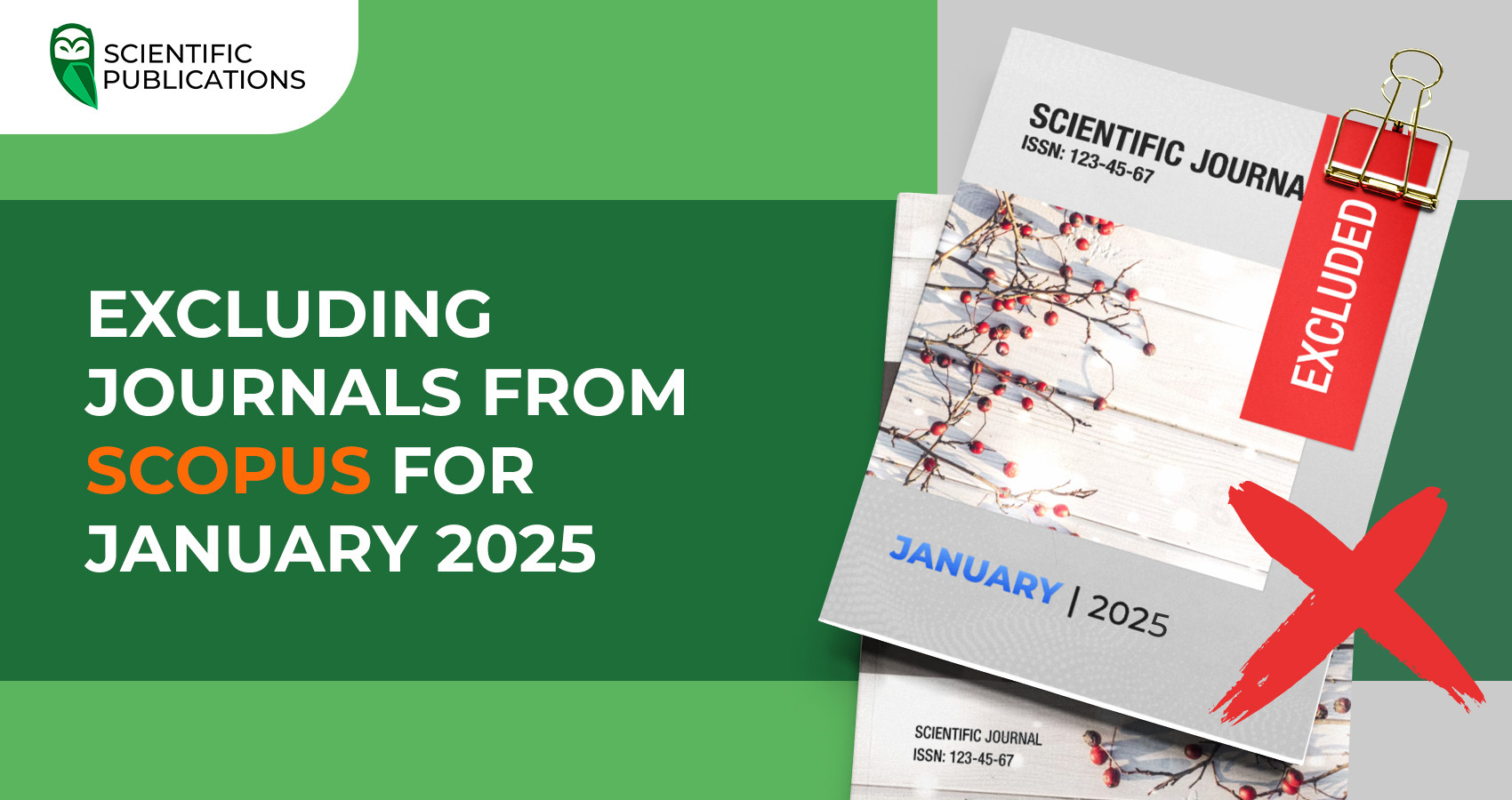Scientific Publications has traditionally presented an up-to-date list of scientific journals excluded from the largest scientometric database Scopus in January 2025. We recommend reading the updated list to find out which journals have lost indexing in Scopus.

Why are journals excluded from the Scopus database?
Scopus – is an international database of scientific content including millions of publications and more than 7000 publishers.
The platform adheres to high quality standards, carefully monitoring both the content and the scientific reputation of publishers. All materials are rigorously reviewed for compliance, and journals are rigorously reviewed for editorial quality and publication integrity.
Every month, scientific journals that no longer meet the established quality standards or violate the platform's rules are excluded from the database.
The main reasons for excluding journals from Scopus:
- Poor editorial work: failure to adhere to peer review and editing standards.
- Low level of published articles: placement of low quality research.
- Violation of scientific ethics: "predatory" journals engaged in unfair publication activities.
- Low scientometric indicators: low level of citation of journals.
Overview of excluded journals for January 2025
In January 2025, indexing was discontinued for 11 scientific journals. The table below presents the full list of publications excluded from Scopus with the reasons for their removal.
|
№ |
Scientific Journal |
ISSN / e-ISSN |
Reasons for exclusion |
|
1 |
Applied Mathematics of Nonlinear Sciences |
Online e-ISSN – 24448656 |
Radar |
|
2 |
International Journal of Experimental Research and Review |
Online e-ISSN – 24554855 |
Publication Concerns |
|
3 |
International Journal of Public Health Science |
Print ISSN – 2252-8806 Online e-ISSN – 2620-4126 |
Radar |
|
4 |
Journal of Ecohumanism |
Print ISSN – 27526798 Online e-ISSN – 27526801 |
Publication Concerns |
|
5 |
Journal of Infrastructure, Policy and Development |
Print ISSN – 2572-7923 Online e-ISSN – 2572-7931 |
Publication Concerns |
|
6 |
Journal of Management World |
Online e-ISSN – 2994-3191 |
Publication Concerns |
|
7 |
Journal of the Knowledge Economy |
Print ISSN – 1868-7865 Online e-ISSN – 1868-7873 |
Radar |
|
8 |
Pakistan Journal of Criminology |
Print ISSN – 2074-2738 Online e-ISSN – 2222-6648 |
Radar |
|
9 |
Pakistan Journal of Life and Social Sciences |
Print ISSN – 17274915 Online e-ISSN – 22217630 |
Publication Concerns |
|
10 |
Pathology Research and Practice |
Print ISSN – 0344-0338 Online e-ISSN – 1618-0631 |
Radar |
|
11 |
RISTI - Revista Iberica de Sistemas e Tecnologias de Informacao |
Print ISSN – 1646-9895 |
Radar |
The most common reason for the exclusion of journals from Scopus is the detection of low quality of published materials by the Radar system.
Radar is a monitoring system developed by Elsevier that monitors scientific journals and identifies publications with deteriorating scientific metrics and unfair editorial policies.
How does the Radar monitoring system work?
Radar was developed by Elsevier to monitor trends in the deteriorating performance of scientific journals indexed in Scopus.
The reasons why scientific publications can be disqualified by the Radar system:
- violation of publication ethics;
- lack of scientific peer review;
- artificially high number of citations;
- non-standardized number of articles per year, which raises doubts about the quality of publications;
- too great thematic diversity (publications on a wide range of disciplines are accepted);
- abrupt change in the scientific orientation of the journal.
In some cases, the system reveals inconsistency with the declared subject of the publication or lack of scientific content in the articles.
Scientific Publications regularly monitors the status of scientific publications indexed in Scopus. Subscribe to our social networks to keep abreast of the latest updates of the largest scientometric database. If you find it difficult to choose a suitable journal for publishing a scientific article, our experts will help you to select a publication with high ratings that will meet your scientific goal. Ordering the service "Publish in Scopus", you get a free audit of your work and selection of journals with high indicators that are suitable for your research.





